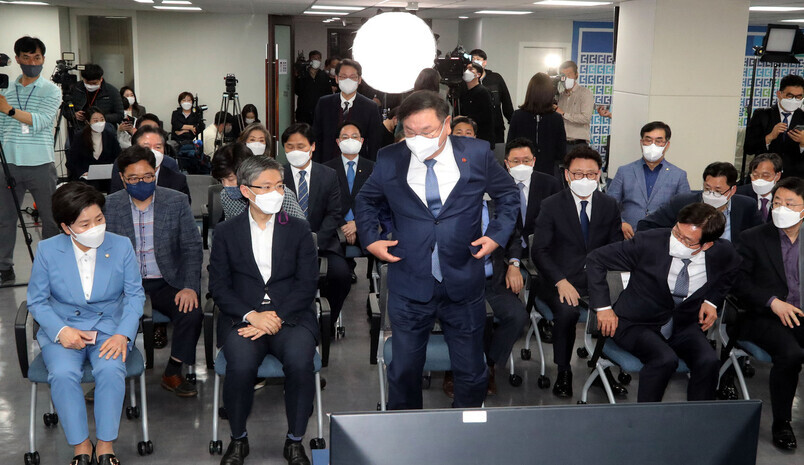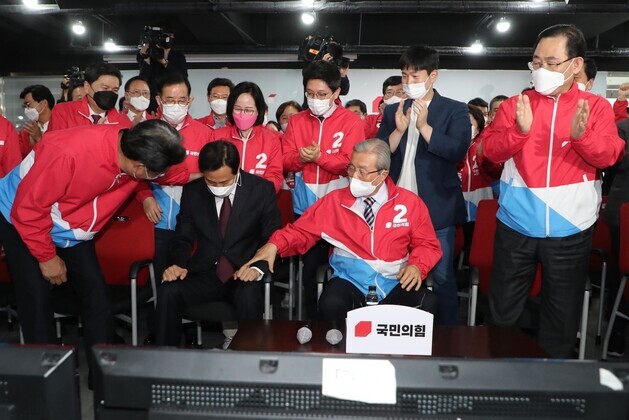hankyoreh
Links to other country sites 다른 나라 사이트 링크
[Reporter's notebook] Ruling party must recover moral leadership to win next presidential election

It was a fearsome display by an angry public. Just a year after a landslide victory that handed it 180 seats in the general elections on April 15, 2020, the Democratic Party came crashing to earth in what amounted to a national election.
Oh Se-hoon, the People Power Party (PPP) candidate for mayor of Seoul, was a weak figure. Yet, a large number of voters cast their ballots for him without a second thought.
They wanted to send a message of judgment toward the Moon Jae-in administration and the Democratic Party. This election wasn't a victory for the opposition — it was a devastating defeat for the ruling party.
There have been wider victory margins in the past. When Oh was first elected mayor of Seoul in 2006, he won 61.05% of the vote, 33.74 percentage points ahead of Kang Kum-sil, who drew 27.31%. That was the election where then-Hannara Party leader Park Geun-hye was slashed in the face by an attacker while campaigning for Oh.
In the 2018 Seoul mayoral election, the late Park Won-soon drew 52.79% of the vote, compared with 23.34% for Kim Moon-soo and 19.55% for Ahn Cheol-soo. The difference between first and second place was 29.45 percentage points. Factors included the inter-Korean summit that year and the split in the opposition vote.
Outside of these two cases, the Seoul mayoral election's victory margins have typically come down to around 10 percentage points. In the 2011 by-election, Park Won-soon beat opponent Na Kyung-won by a margin of 7.2 percentage points.
If we only consider the margin, this latest Seoul mayoral by-election was a resounding defeat for the ruling party. But what is truly important about this result is less the margin than the election's political significance.

To begin with, it puts an end to the Democratic Party's run of victories. It was coming off of winning performances in four straight nationwide elections: the general elections in 2016, the presidential election in 2017, the local elections in 2018 and the general elections last year.
The Wednesday by-election this year was tantamount to a national election. And the fact that the party's run is over means it could well lose in the next election.
The next nationwide election is the presidential election on March 9, 2022. It's a serious roadblock on the Democratic Party's path to reelection.
A second significance is the simultaneous crash in support ratings for the administration and the party.
On March 2, the groups People's Solidarity for Participatory Democracy and MINBYUN-Lawyers for a Democratic Society presented allegations that employees with the Korea Land and Housing Corporation (LH) had pre-purchased land in Gwangmyeong and Siheung ahead of its designation for use in new housing developments.
Up until then, Moon's job performance rating had been holding on in the 40% range. After the allegations broke, it went into a steep decline. The Democratic Party's support ratings have likewise tumbled.
Was the LH scandal really such a major political incident? Not really. So why the sudden outpouring of judgment against the administration?
There is a fundamental reason behind it. According to Ahn Byeong-jin, a professor at the Kyung Hee University Global Academy for Future Civilizations, there was nothing "sudden" about this.
"It started with the [former Minister of Justice] Cho Kuk situation. After taking so many punches for so long, their legs were wobbling, and the LH scandal turned out to be the knockout blow," he explained.
"At root, it's about the double standard," he added.
"This pulled the rug out from under the Moon administration's moral leadership. If you can't recover your moral leadership, then nothing else means anything, whether it's a basic income or basic housing. The next presidential election is going to be dangerous."
There's also a more direct factor. The Moon administration and Democratic Party fatally fumbled their handling of the LH situation.
They saw the essence of the LH issue as being a matter of corruption. They dismissed it as one of the entrenched problems carried over from past administrations.
But the LH situation's real roots lay in the Moon administration's incompetence and failed real estate policies. The public was outraged to see an incompetent administration attempting to shift the blame to its predecessors.
When the diagnosis is wrong, the prescription is likely to be the wrong one too. The Democratic Party consistently hammered at the opposition candidates' improprieties. It painted Oh Se-hoon and Busan mayoral candidate Park Hyung-joon as "avatars" of currently jailed former President Lee Myung-bak.
The Wednesday by-elections devolved into a mud-slinging contest — and the competitiveness of Park Young-sun and Kim Young-choon as candidates evaporated. They walked right into the frame that the opposition had crafted: putting an "arrogant administration" on trial.
The election is over now. Are we really so sure we know why the administration and ruling party lost? We may not know yet.
By Seong Han-yong, senior editorial writer
Please direct comments or questions to [english@hani.co.kr]

Editorial・opinion
![[Editorial] Penalties for airing allegations against Korea’s first lady endanger free press [Editorial] Penalties for airing allegations against Korea’s first lady endanger free press](https://flexible.img.hani.co.kr/flexible/normal/500/300/imgdb/original/2024/0502/1817146398095106.jpg) [Editorial] Penalties for airing allegations against Korea’s first lady endanger free press
[Editorial] Penalties for airing allegations against Korea’s first lady endanger free press![[Editorial] Yoon must halt procurement of SM-3 interceptor missiles [Editorial] Yoon must halt procurement of SM-3 interceptor missiles](https://flexible.img.hani.co.kr/flexible/normal/500/300/imgdb/child/2024/0501/17145495551605_1717145495195344.jpg) [Editorial] Yoon must halt procurement of SM-3 interceptor missiles
[Editorial] Yoon must halt procurement of SM-3 interceptor missiles- [Guest essay] Maybe Korea’s rapid population decline is an opportunity, not a crisis
- [Column] Can Yoon steer diplomacy with Russia, China back on track?
- [Column] Season 2 of special prosecutor probe may be coming to Korea soon
- [Column] Park Geun-hye déjà vu in Yoon Suk-yeol
- [Editorial] New weight of N. Korea’s nuclear threats makes dialogue all the more urgent
- [Guest essay] The real reason Korea’s new right wants to dub Rhee a founding father
- [Column] ‘Choson’: Is it time we start referring to N. Korea in its own terms?
- [Editorial] Japan’s rewriting of history with Korea has gone too far
Most viewed articles
- 160% of young Koreans see no need to have kids after marriage
- 2Presidential office warns of veto in response to opposition passing special counsel probe act
- 3Anti-immigration candidate marauds across Korea with squad detaining foreigners
- 4[Editorial] Penalties for airing allegations against Korea’s first lady endanger free press
- 5Hybe-Ador dispute shines light on pervasive issues behind K-pop’s tidy facade
- 6Months and months of overdue wages are pushing migrant workers in Korea into debt
- 7S. Korea “monitoring developments” after report of secret Chinese police station in Seoul
- 8[Column] Unsettling moves by the UN Command lay way for Korean involvement in Taiwan
- 9Japan says it’s not pressuring Naver to sell Line, but Korean insiders say otherwise
- 10Alleged drug use by Korean A-listers rocks nation – but not for the first time